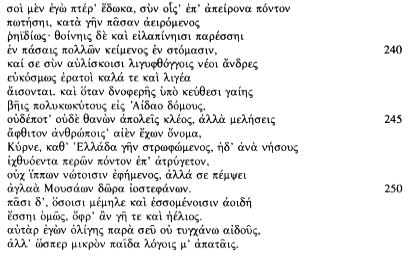|
|
|
|
|
|
|
Romantic Fragments like the Satyricon). I think that one of the clearest examples of Romantic Irony as closural gesture is Theognis' famous promise to Cyrnus in Theognidea 236254: |
|
|
|
|
|
|
|
|
 |
|
|
|
 |
|
 |
|
|
I have given you wings on which you may rise and fly with ease over the endless sea and over the whole earth. You will be present at all feasts and banquets, on the tongues of many men; and young men will sing loud and clear of you during [their] lovely revels accompanied by their little clear-toned flutes. And, when you pass into the hiding places of the dark earth, into the house of Hades filled with lamentation, not even then, not even when dead, will you lose your glory, but, since your name will be undying among men, you will be famous, Cyrnus, as you circle around the land of Greece and the islands, crossing the unharvested fish-rich sea, not riding on mortal horses. The glorious gifts of the violet-crowned Muses will send you on your way, for you will be with all who care and who will care for songs, as long as there is earth and sun. Yet I do not have a little respect from you, but you deceive me with your talk, as if I were a little child (trans. Trypanis). |
|
|
|
|
|
|
|
|
Reading this as a complete, self-contained poem, the structure is clear. The poem pivots at the reference to Cyrnus' name in 2467: 2456 has a strong closural force with its categorical assertion and reference to death and future fame (accompanied by some formal devices like the emphatic Sperrung  ). The poem then restarts in 247 with the actual name and recall of the opening (e.g. the recurrence of the ). The poem then restarts in 247 with the actual name and recall of the opening (e.g. the recurrence of the  opposition and of a pair of middle participles): 2512 then recall both the opening and the false closure of 2456 with yet more categorical assertion of future fame. The 'earth-sea' pairing is now hyperbolically replaced by 'earth-sun' (capping the reference in 2434 to the darkness of Hades): the epic allusion in opposition and of a pair of middle participles): 2512 then recall both the opening and the false closure of 2456 with yet more categorical assertion of future fame. The 'earth-sea' pairing is now hyperbolically replaced by 'earth-sun' (capping the reference in 2434 to the darkness of Hades): the epic allusion in  (2456) is recalled with (2456) is recalled with  with with |
|
|
|
|
|